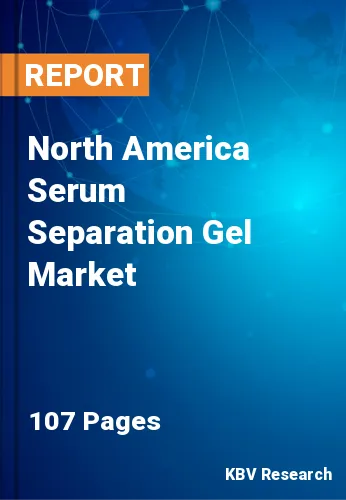Chapter 1. Market Scope & Methodology
1.1 Market Definition
1.2 Objectives
1.3 Market Scope
1.4 Segmentation
1.4.1 North America Serum Separation Gel Market, by Product Type
1.4.2 North America Serum Separation Gel Market, by End User
1.4.3 North America Serum Separation Gel Market, by Country
1.5 Methodology for the research
Chapter 2. Market at a Glance
2.1 Key Highlights
Chapter 3. Market Overview
3.1 Introduction
3.1.1 Overview
3.1.1.1 Market Composition and Scenario
3.2 Key Factors Impacting the Market
3.2.1 Market Drivers
3.2.2 Market Restraints
3.2.3 Market Opportunities
3.2.4 Market Challenges
3.3 Porter’s Five Forces Analysis
Chapter 4. North America Serum Separation Gel Market by Product Type
4.1 North America Serum Separation Gel Integrated with Tube Market by Region
4.2 North America Serum Separation Gel Integrated without Tube Market by Region
Chapter 5. North America Serum Separation Gel Market by End User
5.1 North America Blood Bank Market by Country
5.2 North America Hospital Market by Country
5.3 North America Pharmaceutical & Companies Market by Country
5.4 North America Others Market by Country
Chapter 6. North America Serum Separation Gel Market by Country
6.1 US Serum Separation Gel Market
6.1.1 US Serum Separation Gel Market by Product Type
6.1.2 US Serum Separation Gel Market by End User
6.2 Canada Serum Separation Gel Market
6.2.1 Canada Serum Separation Gel Market by Product Type
6.2.2 Canada Serum Separation Gel Market by End User
6.3 Mexico Serum Separation Gel Market
6.3.1 Mexico Serum Separation Gel Market by Product Type
6.3.2 Mexico Serum Separation Gel Market by End User
6.4 Rest of North America Serum Separation Gel Market
6.4.1 Rest of North America Serum Separation Gel Market by Product Type
6.4.2 Rest of North America Serum Separation Gel Market by End User
Chapter 7. Company Profiles
7.1 Becton, Dickinson, and Company
7.1.1 Company Overview
7.1.2 Financial Analysis
7.1.3 Segmental and Regional Analysis
7.1.4 Research & Development Expense
7.1.5 SWOT Analysis
7.2 F. Hoffmann-La Roche Ltd.
7.2.1 Company Overview
7.2.2 Financial Analysis
7.2.3 Segmental and Regional Analysis
7.2.4 Research & Development Expense
7.2.5 SWOT Analysis
7.3 Abbott Laboratories
7.3.1 Company Overview
7.3.2 Financial Analysis
7.3.3 Segmental and Regional Analysis
7.3.4 Research & Development Expense
7.3.5 SWOT Analysis
7.4 Agilent Technologies, Inc.
7.4.1 Company Overview
7.4.2 Financial Analysis
7.4.3 Segmental and Regional Analysis
7.4.4 Research & Development Expense
7.4.5 Recent strategies and developments:
7.4.5.1 Acquisition and Mergers:
7.4.6 SWOT Analysis
7.5 Siemens Healthineers AG (Siemens AG)
7.5.1 Company Overview
7.5.2 Financial Analysis
7.5.3 Segmental and Regional Analysis
7.5.4 Research & Development Expense
7.5.5 Recent strategies and developments:
7.5.5.1 Partnerships, Collaborations, and Agreements:
7.5.6 SWOT Analysis
7.6 Bio-Rad laboratories, Inc.
7.6.1 Company Overview
7.6.2 Financial Analysis
7.6.3 Segmental and Regional Analysis
7.6.4 Research & Development Expenses
7.6.5 Recent strategies and developments:
7.6.5.1 Partnerships, Collaborations, and Agreements:
7.6.5.2 Product Launches and Product Expansions:
7.6.6 SWOT Analysis
7.7 Danaher Corporation
7.7.1 Company Overview
7.7.2 Financial Analysis
7.7.3 Segmental and Regional Analysis
7.7.4 Research & Development Expense
7.7.5 SWOT Analysis
7.8 Sysmex Corporation
7.8.1 Company Overview
7.8.2 Financial Analysis
7.8.3 Regional Analysis
7.8.4 Research & Development Expense
7.8.5 SWOT Analysis
7.9 Charles River Laboratories International, Inc.
7.9.1 Company Overview
7.9.2 Financial Analysis
7.9.3 Segmental and Regional Analysis
7.9.4 SWOT Analysis
7.10. QuidelOrtho Corporation
7.10.1 Company Overview
7.10.2 Financial Analysis
7.10.3 Regional Analysis
7.10.4 Research & Development Expense
7.10.5 SWOT Analysis

